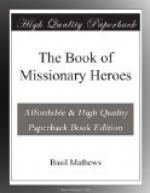“Take, seize, burn the Christians,” he cried. And his executioners and their minions rushed out, captured forty-six men and boys, slashed their arms from their bodies with their cruel curved knives so that they could not struggle, and then placed them over the ghastly flames which slowly wrung the lives from their tortured bodies. Yet the numbers of the Christians seemed to grow with persecution.
The King himself beat one boy, Apolo Kagwa, with a stick and smote him on the head, then knocked him down, kicked and stamped upon him. Then the King burned all his books, crying, “Never read again.”
The other men and boys who had become Christians were now scattered over the land in fear of their lives. Mackay, however, come what may, determined to hold on. He set his little printing press to work and printed off a letter which he sent to the scattered Christians. In Mackay’s letter was written these words, “In days of old Christians were hated, were hunted, were driven out and were persecuted for Jesus’ sake, and thus it is to-day. Our beloved brothers, do not deny our Lord Jesus!”
At last M’wanga’s mad cruelties grew so frightful that all his people rose in rebellion and drove him from the throne, so that he had to wander an outcast by the lake-side. Mackay at that time was working by the lake, and he offered to shelter the deposed King who had only a short time before threatened his life.
* * * * *
Two years passed; and Mackay, on the lake-side, was building a new boat in which he hoped to sail to other villages to teach the people. Then a fever struck him. He lay lingering for some days. Then he died—aged only forty-one.
If Mackay, instead of becoming a missionary, had entered the engineering profession he might have become a great engineer. When he was a missionary in Africa, the British East Africa Company offered him a good position. He refused it. General Gordon offered him a high position in his army in Egypt. He refused it.
He held on when his friends and the Church Missionary Society called him home. This is what he said to them, “What is this you write—’Come home’? Surely now, in our terrible dearth of workers, it is not the time for anyone to desert his post. Send us only our first twenty men, and I may be tempted to come to help you to find the second twenty.”
He died when quite young; homeless, after a life in constant danger from fever and from a half-mad tyrant king—his Christian disciples having been burned.
Was it worth while?
To-day the Prime Minister of Uganda is Apolo Kagwa, who as a boy was kicked and beaten and stamped upon by King M’wanga for being a Christian; and the King of Uganda, Daudi, M’wanga’s son, is a Christian. At the capital there stands a fine cathedral in which brown Baganda clergy lead the prayers of the Christian people. On the place where the boys were burned to death there stands a Cross, put there by 70,000 Baganda Christians in memory of the young martyrs.




